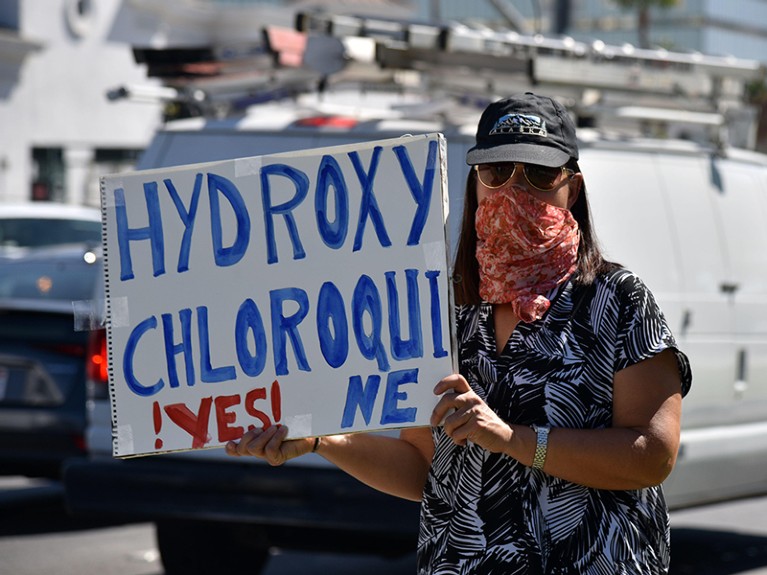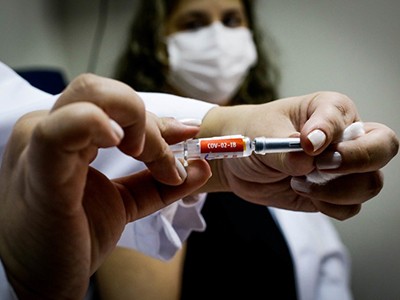
Misinformation — such as the idea that the antimalarial drug hydroxychloroquine can prevent or treat COVID-19 — has flourished during the pandemic.Credit: Alamy
There’s a saying in medicine that decisions were once made by GOBSAT: good old boys sat around a table, pontificating about their own (usually biased) opinions. The GOBSAT method is elitist and exclusionary, and it means that no one knows on what solid evidence, if any, a decision is based. Sadly, this way of making decisions has been on full display in many countries over the past two years.
During the pandemic, governments, businesses and people worldwide have needed rigorous evidence quickly to inform their decisions — on what treatments work for COVID-19, say, or how best to educate children safely. But that pressure has exposed weaknesses in the world’s systems for producing, synthesizing, communicating and using evidence for decision-making. Although research has been essential during the pandemic, too much of it has been of poor quality or hasn’t addressed pressing questions. Researchers who produce evidence syntheses — authoritative reports that summarize a body of research — have been unable to keep up with the pace of new studies. Misinformation has flourished, and politicians and others have often been unable to access the evidence they need.
But researchers are on the case. In the past couple of months, three reports have been published that show what can be done to improve evidence-informed decisions, not only during a pandemic, but in many spheres of public policy, including combating climate change, reducing inequality and improving global health. The reports are ambitious — idealistic, even. But together, they visualize an efficient machinery that can supply fast but rigorous evidence, on time, to those who need it. And they outline a road map to get there, putting equity at the centre and highlighting the very different needs of countries around the world.
The evidence ecosystem
In one report from the Global Commission on Evidence to Address Societal Challenges, a group of 25 people — ranging from politicians to statisticians to citizen leaders — across 6 continents proposes improvements for almost every aspect of the evidence ecosystem. One priority recommendation is for multilateral organizations to provide commitment and greater support for the use of research evidence in making decisions — such as the way the Intergovernmental Panel on Climate Change assesses climate science for policymakers.
How COVID broke the evidence pipeline
Under this global umbrella, the commission recommends that every nation have its own processes to support the use of good evidence. Of course, many nations already do, in the form of science advisers and data-analytics teams attached to government departments. But a common missing ingredient, as the commission rightly points out, is a central agency to help to coordinate these efforts and get the right evidence to those who need it at the right time.
Many of these recommendations are echoed in a call to action issued in December by the health-policy groups that make up the World Health Organization Evidence-informed Policy Network (EVIPNet) and in a report, published in February, by Cochrane, a world-leading supplier of evidence syntheses in health. Cochrane is keen, in particular, to develop evidence-synthesis units in low- and middle-income countries. Only 3–4% of Cochrane review authors were from such countries between 2018 and 2021, an imbalance that needs to be corrected.
A pragmatic approach
Many organizations in low- and middle-income countries are already bridging the chasm between researchers who generate evidence and decision makers who could use it. The Center for Rapid Evidence Synthesis (ACRES) at Makerere University in Uganda is one of them. It receives requests from policymakers and sends back a rapid synthesis of relevant evidence within days or weeks. It has influenced Ugandan policies ranging from food fortification to tuberculosis diagnosis. Health-policy researcher Rhona Mijumbi-Deve, who founded the centre and now advises other nations on setting up similar outfits, told Nature that what sets it apart is the way it provides evidence that policymakers need, tailored for Uganda, at the pace they need it. And it is rightly pragmatic, willing to produce a good review on time, rather than the perfect review too late.
Evidence-based medicine: how COVID can drive positive change
Across the Atlantic, a Latin American evidence hub has been taking shape, co-directed by Laura Boeira, who leads the Instituto Veredas, a non-profit organization focused on evidence-informed policymaking in São Paulo, Brazil. Boeira and her colleagues are seeing a growing appetite for evidence from public officials, despite — or perhaps because of — Brazilian President Jair Bolsonaro’s open disdain for evidence, such as that on COVID-19 vaccines.
Each country needs a mechanism for supplying evidence that is appropriate to its systems of governance and wider needs, but there are some common, essential ingredients too — such as the need for trusted, long-term relationships between researchers and decision makers. Politicians, says Boeira, typically want to call their favourite expert and ask them what to do. By building trust, she wants to make sure that their first call is instead aimed at finding the bestavailable evidence.
The risk for the global evidence commission is that its recommendations are so ambitious that they seem unfeasible or overwhelming. The commissioners are already receiving questions from countries about where to start. A good first step is for a nation or region to take stock of what has worked during the pandemic — the bright spots, such as the centres in Uganda and Brazil — and then figure out what hasn’t worked and what could be done to fill the gaps.
During the pandemic, too many decisions have been made by GOBSATs or by other questionable means. Lessons learnt from COVID-19 provide an opportunity for change, for injecting more-rigorous research and evidence into the way that decisions are reached. We can all start by asking the GOBSATs for the evidence on which their statements are based.

 How COVID broke the evidence pipeline
How COVID broke the evidence pipeline
 Evidence-based medicine: how COVID can drive positive change
Evidence-based medicine: how COVID can drive positive change
 Four principles to make evidence synthesis more useful for policy
Four principles to make evidence synthesis more useful for policy
 A fresh approach to evidence synthesis
A fresh approach to evidence synthesis





